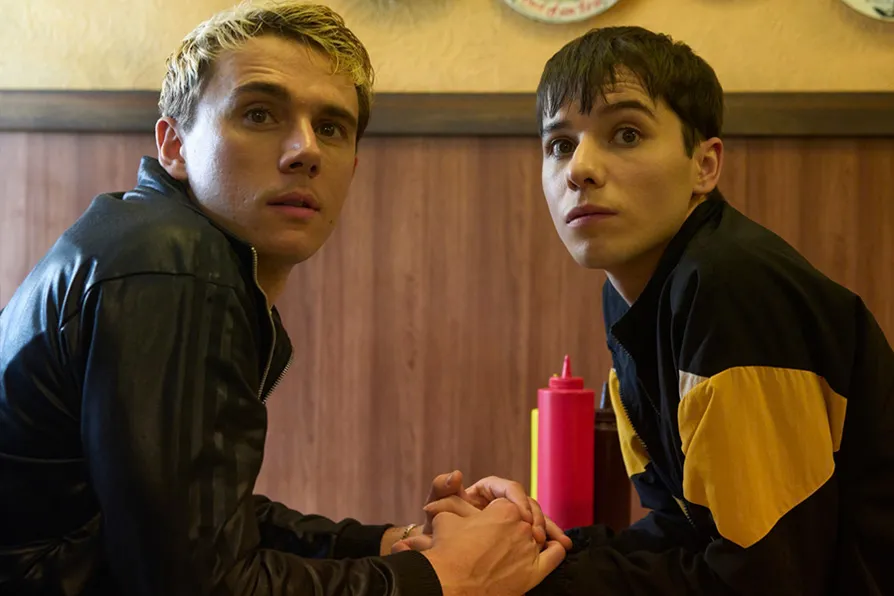MATTHEW HAWKINS enjoys a father’s memoir of life with his autistic son, and the music they explore together
CAL MCBRIDE recommends that you follow a coming-of-age trans story through harrowing lows to a point of optimistic triumph

 BILDUNGSROMANCE: Calam Lynch as Max and Ellis Howard as Byron in What It Feels Like for a Girl [Pic: Enda Bowe]
BILDUNGSROMANCE: Calam Lynch as Max and Ellis Howard as Byron in What It Feels Like for a Girl [Pic: Enda Bowe]
What it feels like for a girl
BBC3/iPlayer
★★★★★
IT was perhaps inevitable that the television adaptation of Paris Lees’s 2021 memoir of growing up trans in Nottingham in the noughties might attract some controversy. The casting of a non-trans actor in the lead looked as if it was going to prompt similar criticism to that of the casting of Eddie Redmayne as Lili Elbe in 2021’s The Danish Girl.
However, even by the end of the first episode of What It Feels Like For A Girl, it’s clear why Lees herself had no problem with the casting of Ellis Howard as her alter ego Byron. Howard’s performance is never anything less than mesmerising and while, particularly in the earlier episodes, Byron can often be painfully self-deluding, cattily cruel and downright selfish, they never fail to take the audience with them through their harrowing lows to a point of optimistic triumph. And there are similarly compelling performances from the rest of the cast.
Nottingham and its environs are as much a character in this story as any of the human protagonists. Both time and place are significant, and both are presented brilliantly (with the passing of time marked by the evolution in the design of mobile phones being a particularly nice touch).
It’s been heartening to see a return to depictions of working-class life in television of late, with the likes of Sherwood and most recently Adolescence, and For A Girl is particularly nuanced in this regard, neither resorting to romanticisation nor demonisation of its characters’ upbringing and environment. The show doesn’t shy away from the bullying and the pervasive effect of working-class toxic masculinity on Byron and others but neither does it neglect to remind us of the strong sense of emotional connection and solidarity that often exists between them.
At eight, 50-minute episodes, the story has space to unfold at a leisurely pace and the early episodes in particular might be harrowing viewing for some with its depictions of noughties rave culture and Byron’s teenage forays into cottaging and transactional sex work that ultimately lead them into armed robbery and subsequent jail time. And the show wisely tempers its bleakest moments with some acerbic humour and even instances of surreal whimsy, for example in a public toilet cottaging scene that turns itself into a song-and-dance number.
However, it’s impossible to view For A Girl completely divorced from the current political situation, the recent Supreme Court ruling and the demonisation and the current attempted erasure of trans people from public life – and nor does the series remotely encourage this. Progress in trans visibility is hard-coded into the show, for example in the inclusion of transgender Big Brother winner Nadia Almada. It’s hard to avoid the clear point that, far from getting better from those days, trans visibility and social acceptance is in fact getting worse.
But wider political points aside, this is still the deeply personal story of Byron’s journey of self-discovery and acceptance and it’s possibly one of the most nuanced depictions of trans awareness, certainly in recent times. Byron’s progress into womanhood is gradual and unforced and neither is it unrealistically foregrounded, thus giving the lie to current transphobic arguments about faddishness and agendas. Byron is never less than a deeply complex human being and her transness, while intrinsic to her identity is not necessarily the most dominant feature of that identity. It’s not something that has been acquired or bolted on but is an essential part of who she has always been.
And it is for this reason, if nothing else, that What It Feels Like For A Girl is essential viewing, particularly for a cis audience, at a time when the trans community is facing ongoing demonisation, misrepresentation and downright erasure. By itself, it’s obviously not going to undo the current damage, but it might nevertheless help begin that process.
What It Feels Like For A Girl is available on BBC iPlayer now.









